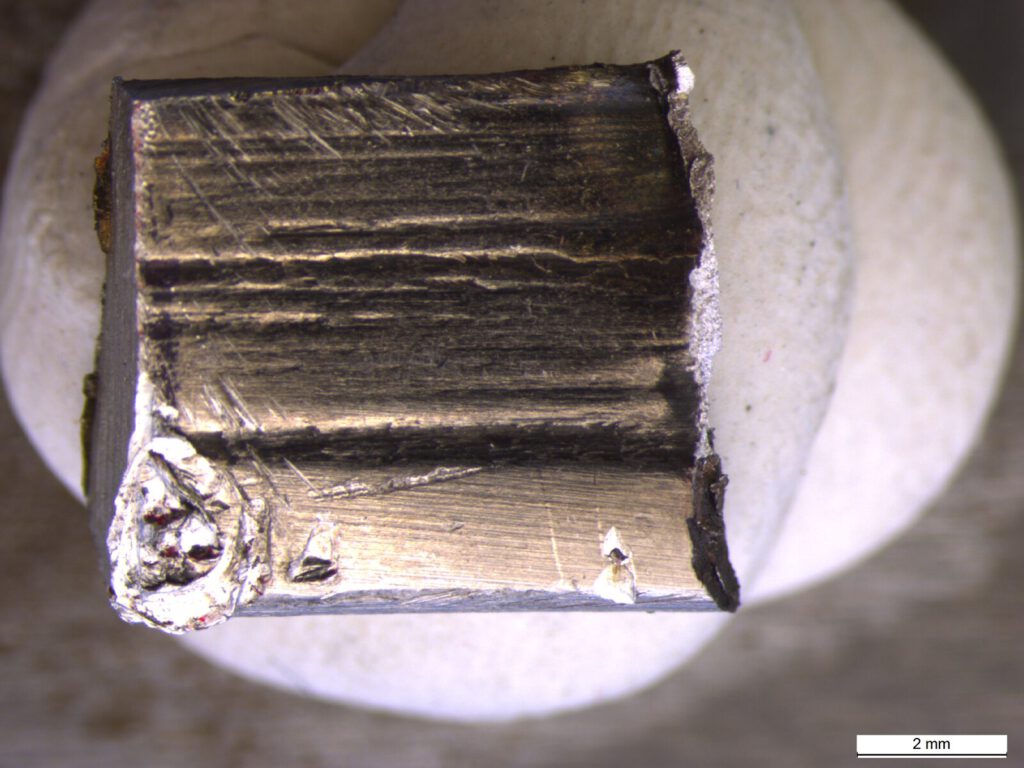Fatigue failure analysis examines material and/or component failure for root cause determination from cyclic load performance during real-world operating conditions.
Qualified Experts and High-Quality Service
ATS’ highly trained engineers design test programs and simulations while conducting various types of fatigue failure analysis. Either standard ASTM methods or functional cyclic testing on actual components may be utilized for this purpose.
As a full-service materials testing, analytical, and component testing lab, ATS specializes in the physical and chemical behavior of materials, which may include:
- Aluminum
- Copper alloys
- Steel
- Stainless steel
- Superalloys
- Titanium
- Ceramics
- Plastics
Our metallurgists and technicians utilize up-to-date technology to perform hardness and tensile testing, chemical analysis, metallography, scanning electron microscopy (SEM), energy dispersive spectroscopy (EDS), visual examination, and optical fractography.
Additionally, our fatigue failure analysis lab performs root cause determination on various other material-related problems such as: overload fractures, cracking, formability issues, microstructural degradation, corrosion, and wear.
Material Identification
An important aspect of fatigue failure analysis consists of material identification. Alloys are a combination of two or more metals, usually to provide greater strength or corrosion resistance. The process of alloy identification methodically identifies the amalgam that makes up the alloy.
Contaminant Identification
Contaminant identification utilizes SEM, which produces brilliant images of surfaces at various powers of magnification up to tens of thousands of times for observation and categorizing a material failure.
In conjunction with SEM, EDS is an analytical capability used for the chemical characterization of the sample in a nondestructive manner.
Microscopy
SEM/EDS and metallography are used in characterizing corrosion-related failures, which may include weld decay, graphitic, corrosion fatigue, galvanic, pitting, crevice, stress corrosion cracking (SCC), and microbiologically influenced corrosion (MIC).
In evaluating the processing history of metals, microstructural analysis is utilized for qualitative observations and quantitative measurements which characterize the effects of various manufacturing or heat treatment processes on a material.
The microstructural analysis includes the determination of grain size, grain flow/orientation, grain structure, phase identification, presence of nitriding, case depth, coating thickness, inclusion morphology, inclusion content, intermetallic phases, porosity, and void orientation.
Hardness Testing
Additional metallurgical services regarding fatigue failure analysis include hardness testing, which measures the resistance of a material to deformation. We perform several types of hardness testing, including:
The ATS Fatigue Lab
Our fatigue failure analysis lab provides testing to a broad range of industries throughout the United States and around the globe, including aerospace, automotive, defense, consumer products, manufacturing, maritime, petrochemical, power generation, pulp and paper, polymer and plastics, and utilities.
ATS experts deliver accurate findings and analysis in our state-of-the-art labs. We follow quality assurance accredited and registered standards such as ISO/IEC 17025:2017 (A2LA), ISO 9001:2015 Quality Management, and Nadcap to meet and/or exceed our client’s needs.
ASTM Specification Capabilities
- ASTM E3
- ASTM E45
- ASTM E112
- ASTM A247
- ASTM B748
- ASTM E1508
- ASTM E18
- ASTM E384
- ASTM E10
- ASTM B487
- ASTM E1245



